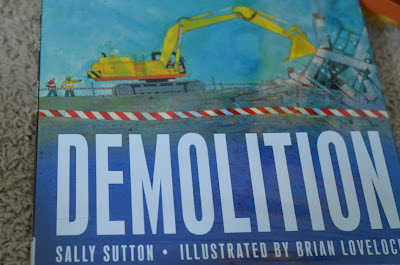We read Demolition by Sally Sutton this week.. The whole book is about the knocking down and cleaning up of a building. We have a crane toy with a wrecking ball so we got the toys out after reading the book to recreate the story. We went page by page and practiced each part.
Jake was soaking it all up. When he is learning something he is straight faced and very sullen. He is just making sure he gets it all in. I know that he will be reenacting this over and over in play. I have many parents do not remember how to play or they do not know how to teach play to their kids. It is not about teaching but modeling. Kids naturally pick up toys and move them around to play but it is taking play into a deeper level (getting lost in play) that is what kids really need to learn to do. Play starts from experiences- small children play what they see or what they have done. Using literature to extend experiences is an excellent way to extend play.
Jake played with this scene for over an hour. And then when you add the number of times he plays this you are talking days of fun that this book has added to Jake's play.




Comments
Post a Comment